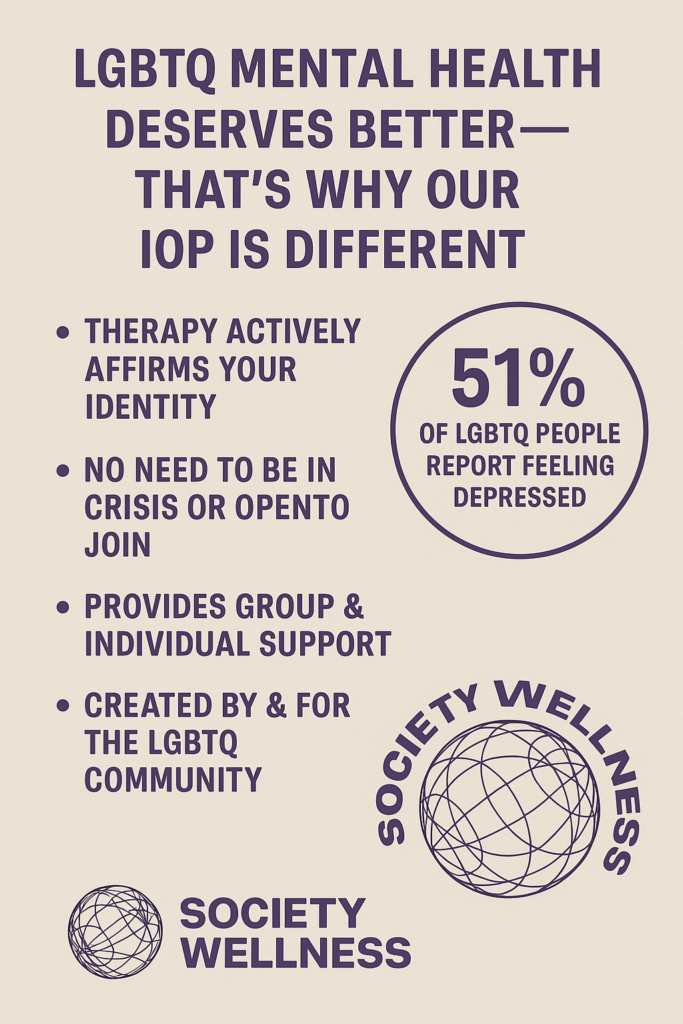Sometimes You’re Not in Crisis—You’re Just Ready for Something More
Not everyone who seeks mental health care is in a full-blown crisis. Some of us are just quietly burning out. Feeling flat, off, or stuck. Wanting more ease, more clarity, more self-understanding—but unsure where to start.
If that sounds familiar, and you’re LGBTQ, you probably also know what it’s like to wonder: Will this space get me? Will I have to explain myself? Will I feel safe enough to be honest?
At Society Wellness, our LGBTQ-focused Intensive Outpatient Program (IOP) was built to answer those questions with a steady, affirming yes. Here’s how—and why—we do things differently.
What Is an IOP—And Why It Might Be Exactly the Right Fit
An Intensive Outpatient Program (IOP) is a structured mental health treatment format that offers more depth than weekly therapy, but more flexibility than inpatient care. It typically involves multiple sessions per week, including group therapy, individual therapy, and skills-based support.
Our LGBTQ IOP is especially suited for those who:
- Need structured support but want to live at home
- Are navigating anxiety, depression, trauma, or stress
- Are exploring identity or processing past invalidation
- Want to build emotional tools in an affirming space
This format is ideal for those who are “doing okay” on the surface but want more from their mental health care. It helps you stay connected to your life while prioritizing your healing.
LGBTQ-Affirming Isn’t a Buzzword—It’s Our Foundation
At Society Wellness, LGBTQ-affirming isn’t an afterthought. It’s how we build everything. That includes hiring and training clinicians with lived experience, shaping our group curriculum to reflect LGBTQ realities, and creating environments where your identity doesn’t need to be explained—just respected.
Here’s what that looks like in practice:
- Pronouns and names are honored—without reminders.
- Group topics include: queer identity development, coming out at different life stages, navigating microaggressions, and healing from religious trauma.
- Therapists are culturally competent and many are part of the LGBTQ community themselves.
- Therapy isn’t neutral: It actively affirms your identity and honors your lived experience.
This means less time spent explaining and more time actually healing.
You Don’t Have to Be in Crisis to Deserve Support
Too many LGBTQ people are taught to wait until they’re “really struggling” to get help. But our program makes space for the in-between: the emotional clutter, the self-doubt, the quiet discomfort that says, “Something’s not right, and I want to feel better.”
Common reasons clients choose our IOP:
- You’ve been in therapy, but it hasn’t felt LGBTQ-competent
- You’re coping well enough but feeling unfulfilled
- You’re questioning your identity or re-evaluating your mental health
- You’re emotionally fatigued from masking, code-switching, or managing stigma
Care shouldn’t be reserved for emergencies. You’re allowed to want more ease, more clarity, and more alignment.

Real Connection, Not Just Coping Skills
Mental health support often focuses on what’s “wrong” with you. Our IOP is different.
We focus on what’s true for you. That includes:
- Building resilience without bypassing real pain
- Creating safer relationships with self and others
- Unlearning internalized shame
- Understanding how systemic oppression impacts mental health
You’ll learn coping skills, yes—but you’ll also experience meaningful connection. Many clients tell us this is the first time they’ve felt seen in a therapeutic space.
“For the first time, therapy didn’t feel like performing wellness. It felt like finally being allowed to feel.”
– LGBTQ IOP Client, 2023
Designed by People Who Get It
Our program was designed with and for LGBTQ people. That means we’re not retrofitting a traditional IOP with rainbow logos. We’re reimagining mental health care from the ground up.
You’ll see the difference in:
- Language that doesn’t assume heterosexuality or binary gender
- Group norms that prioritize emotional safety
- Therapists who understand that “coming out” is not a one-time event
- Peers who offer community, not just company
We believe healing happens best in spaces where your full self is not just welcomed—it’s understood.
FAQ: What You Might Be Wondering
Do I have to be out to join the program?
No. Whether you’re out, questioning, fluid, or private about your identity, you are welcome here. We respect where you are in your journey.
Is this only for people in crisis?
Not at all. Many of our clients are high-functioning, curious, or just emotionally tired. You don’t have to be in crisis to benefit from our IOP.
What kinds of therapy are included?
Our IOP includes evidence-based practices like CBT, DBT, and trauma-informed care, all adapted to LGBTQ experiences. Group therapy, individual sessions, and skill-building workshops are part of the weekly structure.
How long does the IOP last?
Most clients participate in our IOP for 8 to 12 weeks, attending 3-5 sessions per week. We tailor care to your needs and goals.
What if I’ve tried therapy before and it didn’t work?
That’s more common than you think. Many LGBTQ folks haven’t had affirming care. We encourage you to explore this space where your identity is central to the support you receive.
Ready to Feel Seen in Your Mental Health Care?
You deserve care that honors your full identity—not just your symptoms.
📞 Call us at (888) 964-8116 to learn more about our LGBTQ IOP. No pressure, no labels—just a real conversation about what support could look like for you.
Learn more at Society Wellness LGBTQ Behavioral Health.

